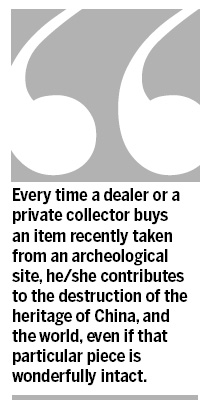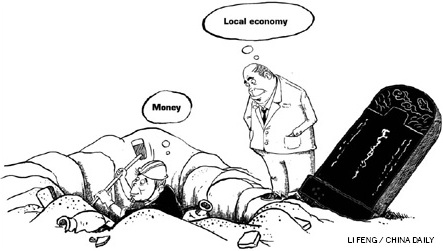Op-Ed Contributors
Tomb raiders and destruction of history
By Magnus Fiskesjo (China Daily)
Updated: 2010-06-23 07:56
 |
Large Medium Small |

China's cultural heritage is not just a matter for China. It is also world heritage. Its protection is in the interest of the whole world.
As a foreign scholar of Chinese archeology, when asked if ancient tombs like that of the historical figure, general Cao Cao (AD 155 - 220), of the Three Kingdoms period (AD 220-280), or of Qin Shi Huang (259 -210 BC), the First Emperor of the Qin Dynasty (221-206 BC) should be opened or not, the first answer has to be that it is a question that only the Chinese can answer.
When an archeological site is discovered, it is not just individual artifacts that are important, but the layout of the site, the arrangement of objects, the plant and animal remains, and other aspects that are often overlooked or even invisible to nonspecialists, who also, because of ignorance, often contaminate such remains. That's why it is important to allow expert archeologists to set priorities and carry out the work. Otherwise, all the potential knowledge about our heritage can be lost forever.
The excitement over the discovery of Cao Cao's tomb, investigated since 2008, is understandable because he is a very famous historical figure. It is no surprise that research resources are being allocated to carefully investigate the site. But there is also reason for widespread regret across China and beyond. Media reports say robbers raided the tomb before it could be investigated properly.
When tomb robbers ravage a site, their goal is to take things they can sell to antique smugglers, dealers and collectors. For every item they can lay their hands on, they trample 10 others. This is in addition to disturbing the site's original arrangement, and contaminating the remains.
I have heard reports that more and more tomb robbers are using the latest technology to achieve their goals. In one case, for example, the tomb diggers were said to be receiving directives from city-based smugglers by sending them photographs taken on mobile phone as "progress reports".
Such looters and middle-men should of course be arrested and punished. But they are not the key problem. Much more important is the issue of the market and the buyers of these antiques, without whom the looting would not take place. Every time a dealer or a private collector buys an item recently taken from an archeological site, he/she contributes to the destruction of the heritage of China, and the world, even if that particular piece is wonderfully intact. In reality, it is an orphan deprived of its "family history", violently torn out of its original setting.
Many collectors do not want to believe this. They are mesmerized by a singular piece, for they have not seen the heart-breaking damage done by tomb robbers with their own eyes (it happens out of view, in the darkness). If pressed, they might come up with the usual arguments about how "if I did not buy it, someone else would", or even "it is better that a Chinese rather than a foreign collector owns an ancient Chinese object".
But this is dubious, since whoever would own such a piece, the damage to its site of origin is irreparable. It destroys the possibility to learn about our history. It also destroys the potential for local tourism development. To me, it seems that China needs more publicity about the ongoing destruction of sites such as Cao Cao's tomb, and the accompanying loss of knowledge.
Alongside the antique shopping shows on TV, there could be programs that highlight this destruction. One could make arrested robbers walk the sites with reporters, under experts' guidance, and explain the damage they have done and reveal the names of persons who paid them to do it. Similar tell-all shows could be conducted with dealers who knowingly sell recently stolen items. One could interview collectors, and ask them to reflect on the sad consequences of their activity.
In Western countries, the most effective medicine against the pretense of innocence in looted objects' trade was the shock a few years ago, when Italian police broke up the Medici smuggler ring selling looted Mediterranean antiquities to major museums in the US. Their notebooks and Polaroid photographs told the shameful story. Most of these museums are now publicly committed to not buying recently looted objects, and the morality of collecting archeological objects has come under debate.
Perhaps a similar measure in China could shake up the market, so that it would no longer be honorable, but shameful, to own a recently looted piece of antiquity.
The author is professor of anthropology at Cornell University, New York, and former director of Museum of Far Eastern Antiquities in Stockholm, Sweden.

(China Daily 06/23/2010 page9)



